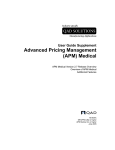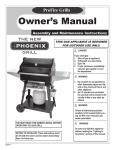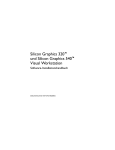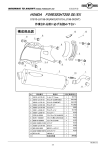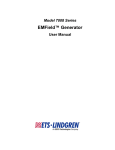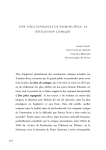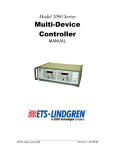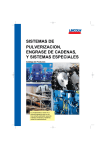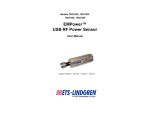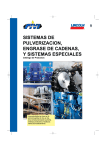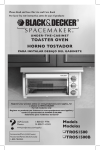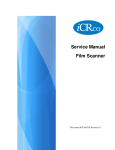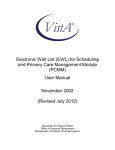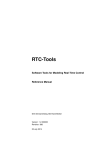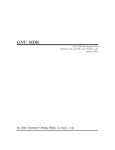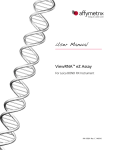Download Manual - ETS
Transcript
Model 7006-001 EMControl™ Positioner Controller Plug-In Card User Manual ETS-Lindgren Inc. reserves the right to make changes to any product described herein in order to improve function, design, or for any other reason. Nothing contained herein shall constitute ETS-Lindgren Inc. assuming any liability whatsoever arising out of the application or use of any product or circuit described herein. ETS-Lindgren Inc. does not convey any license under its patent rights or the rights of others. © Copyright 2014–2015 by ETS-Lindgren Inc. All Rights Reserved. No part of this document may be copied by any means without written permission from ETS-Lindgren Inc. Trademarks used in this document: The ETS-Lindgren logo is a registered trademark, and EMCenter, EMControl, TILE!, and EMQuest are trademarks of ETS-Lindgren Inc. Revision Record MANUAL, EMCONTROL | Part #399348, Rev. C ii Revision Description Date A Initial Release May, 2014 B Updated EMCenter models June, 2014 C Updated commands September, 2015 ets-lindgren.com Table of Contents Notes, Cautions, and Warnings .............................................. vii 1.0 Introduction .......................................................................... 9 EMCenter Modular RF Platform (Required) .............................................. 10 Standard Configuration ............................................................................. 11 Optional Items .......................................................................................... 11 ETS-Lindgren Product Information Bulletin ............................................... 11 2.0 Maintenance ....................................................................... 13 Maintenance of Fiber Optics ..................................................................... 13 Service Procedures .................................................................................. 14 Contacting ETS-Lindgren .................................................................. 14 Sending a Component for Service..................................................... 14 Calibration Services and Annual Calibration...................................... 14 3.0 Specifications ..................................................................... 15 Performance Specifications ...................................................................... 15 4.0 EMControl Plug-In Card Installation ................................ 17 Plug-In Card Installation............................................................................ 17 5.0 Operation ............................................................................ 19 EMControl Connectors and Indicators ....................................................... 19 Device 1 / Device 2 ........................................................................... 19 AUX .................................................................................................. 20 Connecting Devices to EMControl ............................................................ 20 Device 1 / Device 2: Towers and Turntables ..................................... 20 AUX: Additional Devices ................................................................... 20 Powering On and Off EMCenter................................................................ 20 Power On.......................................................................................... 21 Power Off.......................................................................................... 22 Manual Control of EMControl .................................................................... 23 Initiate Movement.............................................................................. 24 Seek to A Specific Position for Connected Tower/Turntable .............. 25 Stop Movement................................................................................. 25 Initiate Movement Between Upper and Lower Limit........................... 25 Change Current Position ................................................................... 26 ets-lindgren.com iii Change Speed .................................................................................. 26 Control Auxiliary Devices .................................................................. 27 Change Other Settings...................................................................... 27 Define Speed Presets ....................................................................... 29 Set Up Devices ................................................................................. 30 6.0 EMControl Command Set ................................................. 33 Detailed Description of Remote Commands .............................................. 34 Detailed Command List............................................................................. 35 ACC .................................................................................................. 35 ACC? ................................................................................................ 35 AUX# ................................................................................................ 36 AUX#? .............................................................................................. 36 CAL .................................................................................................. 37 CAL? ................................................................................................ 37 CC .................................................................................................... 38 CL ..................................................................................................... 39 CL? ................................................................................................... 39 CP .................................................................................................... 40 CP? .................................................................................................. 41 CW ................................................................................................... 41 CY .................................................................................................... 42 CY? .................................................................................................. 42 DIR? ................................................................................................. 43 DN .................................................................................................... 43 ERE .................................................................................................. 44 ERE? ................................................................................................ 45 ERR? ................................................................................................ 46 LH ..................................................................................................... 48 LH? ................................................................................................... 48 LL ..................................................................................................... 49 LL? ................................................................................................... 50 LV ..................................................................................................... 51 LV? ................................................................................................... 51 MBSND............................................................................................. 52 MBSND?........................................................................................... 52 PARM:BCT ....................................................................................... 53 iv ets-lindgren.com PARM:BCT? ..................................................................................... 53 PARM:LIMST .................................................................................... 54 PARM:LIMST? .................................................................................. 54 PARM:QKST..................................................................................... 55 PARM:QKST?................................................................................... 55 PH .................................................................................................... 56 PV..................................................................................................... 56 P? ..................................................................................................... 57 S# ..................................................................................................... 58 S? ..................................................................................................... 58 SC .................................................................................................... 59 SC? .................................................................................................. 59 SEP .................................................................................................. 60 SEP? ................................................................................................ 60 SK..................................................................................................... 61 SKN .................................................................................................. 62 SKP .................................................................................................. 63 SKR .................................................................................................. 64 SPEED ............................................................................................. 65 SPEED? ........................................................................................... 65 SS#................................................................................................... 66 SS#?................................................................................................. 67 ST ..................................................................................................... 67 TT ..................................................................................................... 68 TWR ................................................................................................. 69 TYP? ................................................................................................ 70 UH .................................................................................................... 71 UH? .................................................................................................. 71 UL ..................................................................................................... 72 UL? ................................................................................................... 73 UP .................................................................................................... 73 UV .................................................................................................... 74 UV? .................................................................................................. 74 VS?................................................................................................... 75 WL .................................................................................................... 75 WL? .................................................................................................. 76 ets-lindgren.com v ZERO ............................................................................................... 77 ZERO?.............................................................................................. 77 IEEE 488.2 Mandatory Instruction Set ...................................................... 78 *CLS ................................................................................................. 78 *ESE ................................................................................................. 79 *ESE? ............................................................................................... 80 *IDN? ................................................................................................ 81 *OPC? .............................................................................................. 82 *RST ................................................................................................. 82 *SRE................................................................................................. 83 *SRE?............................................................................................... 84 *STB? ............................................................................................... 85 *WAI ................................................................................................. 86 Error Codes .............................................................................................. 87 Appendix A: Warranty ............................................................. 89 Duration of Warranties for EMControl Plug-In Card ................................... 89 Appendix B: EC Declaration of Conformity .......................... 91 vi ets-lindgren.com Notes, Cautions, and Warnings Note: Denotes helpful information intended to provide tips for better use of the product. Caution: Denotes a hazard. Failure to follow instructions could result in minor personal injury and/or property damage. Included text gives proper procedures. Warning: Denotes a hazard. Failure to follow instructions could result in SEVERE personal injury and/or property damage. Included text gives proper procedures. Note: See the ETS-Lindgren Product Information Bulletin for safety, regulatory, and other product marking information. ets-lindgren.com vii This page intentionally left blank. viii ets-lindgren.com 1.0 Introduction The ETS-Lindgren EMControl™ Positioner Controller Plug-in Card is a versatile positioner controller which enables you to synchronize the simultaneous movements of up to two ETS-Lindgren positioning devices (for example, towers or turntables) and the on/off operation of an additional auxiliary device, such as a LISN or EUT. EMControl allows a target location to be entered manually or under software control to redirect the device from its current location to another position. EMControl incorporates advanced acceleration and deceleration algorithms to accurately control variable, high speed drives. Multiple EMControl cards can be utilized for applications with more than two positioning devices. EMControl is designed for use with the EMCenter™ Modular RF Platform; for more information about EMCenter, see page 10. Note: EMControl is fully compatible with ETS-Lindgren towers and turntables manufactured in 2005 and later. Contact ETS-Lindgren for additional information. ets-lindgren.com Introduction 9 EMCenter Modular RF Platform (Required) The EMCenter Modular RF Platform is required for operation, and is sold separately. Front Panel Back Panel The EMCenter may be controlled from a computer using these software products: ETS-Lindgren TILE!™ (Totally Integrated Laboratory Environment) ETS-Lindgren EMQuest™ Data Acquisition and Analysis Software Other test automation software Contact ETS-Lindgren for ordering information. 10 Introduction ets-lindgren.com Standard Configuration EMControl Positioner Controller Plug-in Card Optional Items Fiber optic cable ETS-Lindgren Product Information Bulletin See the ETS-Lindgren Product Information Bulletin included with your shipment for the following: Warranty information Safety, regulatory, and other product marking information Steps to receive your shipment Steps to return a component for service ETS-Lindgren calibration service ETS-Lindgren contact information ets-lindgren.com Introduction 11 This page intentionally left blank. 12 Introduction ets-lindgren.com 2.0 Maintenance CAUTION: Before performing any maintenance, follow the safety information in the ETS-Lindgren Product Information Bulletin included with your shipment. WARNING: Maintenance of the EMControl card is limited to external components such as cables or connectors. WARRANTY If you have any questions concerning maintenance, contact ETS-Lindgren Customer Service. Maintenance of Fiber Optics The fiber optic cables and connectors used with EMControl™ Positioner Controller Plug-in Card can be damaged from airborne particles, humidity and moisture, oils from the human body, and debris from the connectors they plug into. Always handle connectors and cables with care. Fiber optic cables and connectors are easily broken if twisted or bent. Make sure the fiber optic cabling does not hang unsupported from where it connects to the EMControl card. Keep the cables as straight as possible from the connector to the protective sheath. Following are additional guidelines to protect fiber optic cables. ets-lindgren.com Maintenance 13 CAUTION: Before performing any maintenance, disconnect the fiber optic cables from the unit and turn off power. When disconnecting fiber optic cables, apply the included dust caps to the ends to maintain their integrity. Before connecting fiber optic cables, clean the connector tips and in-line connectors. Before attaching in-line connectors, clean them with moisture-free compressed air. Failure to perform these tasks may result in damage to the fiber optic connectors or cables. Service Procedures CONTACTING ETS-LINDGREN Note: Please see www.ets-lindgren.com for a list of ETS-Lindgren offices, including phone and email contact information. SENDING A COMPONENT FOR SERVICE For the steps to return a system or system component to ETS-Lindgren for service, see the Product Information Bulletin included with your shipment. CALIBRATION SERVICES AND ANNUAL CALIBRATION See the Product Information Bulletin included with your shipment for information on ETS-Lindgren calibration services. 14 Maintenance ets-lindgren.com 3.0 Specifications Note: For complete operating specifications, see the EMCenter Modular RF Platform User Manual. Performance Specifications Linear Resolution: 0.1 cm Rotation Resolution: 0.1º Form Factor: Occupies one slot of EMCenter Fiber Optic I/O: Device 1: In (1), Out (1) Device 2: In (1), Out (1) Auxiliary (2) ets-lindgren.com Specifications 15 This page intentionally left blank. 16 Specifications ets-lindgren.com 4.0 EMControl Plug-In Card Installation CAUTION: : Before connecting any components, follow the information in the ETS-Lindgren Product Information Bulletin included with your shipment. Caution: The EMControl card is designed to be used ONLY with the EMCenter. Do not use the card in combination with any other system. Plug-In Card Installation 1. Determine in which empty slot in the EMCenter™ Modular RF Platform you want to install the EMControl™ Positioner Controller Plug-in Card. Looking at the back of the EMCenter, the slots are numbered 1 through 7 from left to right. 2. Remove the blank panel from the slot by removing the two screws at the top of the blank panel and the two screws at the bottom. 3. Carefully insert the EMControl card into the slot of the EMCenter. Tighten the four screws. 4. Turn on the EMCenter. The EMCenter will automatically detect the newly-installed EMControl card. 5. Depending on the test setup requirements, connect coaxial cables to the relay connections on the back panel of the EMCenter. 6. Connect the EMCenter to a personal computer using USB, RS-232, Ethernet, or IEEE (optional). 7. Plug the interlock into the connector on the back of the EMCenter. The card installation is complete. You can control EMControl through the EMCenter touchscreen, with ETS-Lindgren TILE!™ (Totally Integrated Laboratory Environment), ETS-Lindgren EMQuest™ Data Acquisition and Analysis Software, and other test automation software packages. Contact ETS-Lindgren for additional information. ets-lindgren.com EMControl Plug-In Card Installation 17 This page intentionally left blank. 18 EMControl Plug-In Card Installation ets-lindgren.com 5.0 Operation CAUTION: Before placing into operation, follow the safety information in the ETS-Lindgren Product Information Bulletin included with your shipment. CAUTION: Prior to operation, verify that the mains voltage is within the operating range of the equipment. EMControl Connectors and Indicators Note: For information on connecting devices to EMControl, see the next section on page 20. DEVICE 1 / DEVICE 2 The EMControl™ Positioner Controller Plug-in Card provides IN and OUT ports for connecting any combination of towers and turntables, up to two devices. Use DEVICE 1 to connect a tower. Use DEVICE 2 to connect a turntable. ets-lindgren.com Operation 19 AUX EMControl provides two ports for connecting additional devices, such as LISNs (Line Impedance Stabilization Network) and EUTs (Equipment Under Test). They may be connected in any combination, up to two devices. Use AUX 1 and AUX 2 to connect an additional device. Connecting Devices to EMControl DEVICE 1 / DEVICE 2: TOWERS AND TURNTABLES To connect a tower or turntable to EMControl, use the dual fiber optic cable included with the device. The dual fiber optic cable provides two ST connectors at each end; either end can be connected to EMControl. 1. Plug an ST connector at one end of the fiber optic cable to the IN port of the device, and plug the ST connector at the other end to the OUT port on the EMControl card. 2. Plug the remaining ST connector at one end of the fiber optic cable to the OUT port of the device, and plug the remaining ST connector at the other end to the IN port on the EMControl card. AUX: ADDITIONAL DEVICES Connect additional devices such as LISNs and EUTs to the AUX 1 and AUX 2 ports on the EMControl card. Use AUX 1 if connecting a single additional device. Powering On and Off EMCenter Note: For information on using the EMCenter touchscreen, see the EMCenter Modular Test System User Manual. 20 Operation ets-lindgren.com POWER ON Note: If no devices are connected to EMControl, or if they are connected improperly, dashes will display on the screen when the power is turned on. Note: Verify all cards are installed correctly in the EMCenter. Verify all devices are properly connected to the EMControl card. 1. Plug the power cord from the mains inlet on the back panel of the EMCenter into a power outlet. 2. Plug the interlock jack into the interlock connector on the back panel of the EMCenter. 3. Turn the power switch located on the back panel of the EMCenter to the on position. 4. Touch anywhere on the EMCenter screen. It will take approximately 20 seconds to boot. The Information screen will flash, and then the Home screen will display. Sample EMCenter Home Screen ets-lindgren.com Operation 21 POWER OFF 1. Press the Off button located on the EMCenter screen. 2. Press OK to switch off the system. The standby light located on the front panel of the EMCenter will flash, and then will illuminate steadily. Note: When the EMCenter is in standby mode, touch the screen anywhere to reboot. 22 3. Turn the power switch located on the back panel of the EMCenter to the off position. 4. Remove the power cord from the power connector on the back panel of the EMCenter. 5. Remove the interlock jack from the interlock connector on the back panel of the EMCenter. Operation ets-lindgren.com Manual Control of EMControl To control the movement of the connected positioning equipment and change settings, on the Home screen press the status box to the right of the slot number for the installed EMControl plug-in card (see page 21 for a sample Home screen). This will display the following EMControl screen: Sample EMControl screen Following is a description of each function you can perform from the EMControl screen: Initiate Movement—see page 24 Seek to a Specific Position for Connected Tower/Turntable—see page 25 Stop Movement—see page 25 Initiate Movement Between Upper and Lower Limit—see page 25 Change Current Position—see page 26 Change Speed—see page 26 Control Auxiliary Devices—see page 27 Change Other Settings—see page 27 Define Speed Presets—see page 29 Set Up Devices—see page 30 ets-lindgren.com Operation 23 INITIATE MOVEMENT From the EMControl screen use the Down button or Up button for a linear device like an antenna mast; use the CCW button or CW button for a rotational device like a turntable. Depending on the mode, these buttons will cause a different reaction. The mode can be set to Jog, Step, or Run. Jog mode—Movement continues as long as the button remains pressed. Releasing the button will stop the movement. Step mode—Each button push will result in motion defined by the step size. Step size is configured in StepSize on the Configuration screen; see Change Other Settings on page 27. Run mode—A button push initiates movement. Movement stops only when the Stop button is pressed. 24 Operation ets-lindgren.com SEEK TO A SPECIFIC POSITION FOR CONNECTED TOWER/TURNTABLE From the EMControl screen press the button displaying the current position. When the following Settings screen displays, enter the new number at the keypad, and then press Seek Position to move to this position. EMControl Settings screen STOP MOVEMENT From the EMControl screen press Stop. INITIATE MOVEMENT BETWEEN UPPER AND LOWER LIMIT From the EMControl screen press Scan to initiate movement between the upper and lower limit for the number of cycles set in the Scan Cycle Count on the Configuration screen. Limits are also configured in the Configuration screen. For information on the Configuration screen, see page 27. ets-lindgren.com Operation 25 CHANGE CURRENT POSITION From the EMControl screen press the button displaying the current position for the connected turntable or tower. When the Settings screen displays, enter the new number at the keypad, and then press Set Current to set this value as the current position. CHANGE SPEED Speed is expressed as a percentage of maximum speed; there are eight speeds to choose from. To change the speed, from the EMControl screen press Speed and then select the required speed from the Speeds screen. The eight preset speeds available are configured by using the Speed Presets button in the Configuration screen. For information on Speed Presets, see page 29. EMControl Speeds screen 26 Operation ets-lindgren.com CONTROL AUXILIARY DEVICES To toggle the auxiliary ports 1 and 2 between on and off, from the EMControl screen press the AUX1 and AUX2 buttons. CHANGE OTHER SETTINGS To change other settings for the connected positioning equipment, from the EMControl screen press Config to display the following Configuration screen. EMControl Configuration screen Upper Limit/CW Limit Displays the current setting for the device. Upper limit is for towers and CW limit for turntables. To change the current setting, press Upper limit / CW Limit, enter the new number at the keypad, and then press degr. (for turntable) or cm (for tower). ets-lindgren.com Operation 27 Lower Limit/CCW Limit Displays the current setting for the device. Lower Limit is for towers and CCW limit is for turntables. To change the current setting, press Lower limit/ CCW Limit, enter the new number at the keypad, and then press degr. (for turntable) or cm (for tower). Current Position Displays the current position for the device. To change the current setting, press Current position, enter the new number at the keypad, and then press degr. (for turntable) or cm (for tower). Scan Cycle Count Displays the scan cycle count, the number of times the positioner will move between the upper and lower limit while scanning. To change the current setting press Scan Cycle Count, enter the new number at the keypad and press Enter. Step Size Displays the step size, the number of degrees or cm the positioner will move in Step mode. To change the current setting press Step Size, enter the new number at the keypad and press Enter. 28 Operation ets-lindgren.com DEFINE SPEED PRESETS The Speed Presets screen enables you to define the eight speeds available for the positioner as a percentage of the maximum speed. Speeds can be preset for each device. From the EMControl screen press Config to display the Configuration screen, and then press Speed Presets to access the Speed Presets screen. Press Speed, use the keypad to enter the percentage of maximum speed, and then press the % button. EMControl Speed Presets screen The jog speed can be set to a value different from the other speeds. Set jog speed to Disabled to use the same speed in jog mode. Device Acceleration sets the time to ramp up to the set speed from stop and the time to ramp down from set speed to stop. This can be set for each device individually. Press Device Acceleration, enter the time using the keypad, and then press s (seconds). ets-lindgren.com Operation 29 The Device Setup screen contains information about the device. From the EMControl screen press Config to display the Configuration screen, and then press Device 1 Setup or Device 2 Setup. SET UP DEVICES EMControl Device Setup screen (Device 1) EMControl Device Setup screen (Device 2) 30 Operation ets-lindgren.com Press Device Name to enter a custom name for the device. Press Device Type to select the type of device: linear (tower) or rotational (turntable). For rotational devices, a Continuous or non-Continuous mode sub-type can be selected; for linear devices a Tower or Bore Sight Tower sub-type can be selected. In the continuous mode of operation a turntable is allowed unlimited movement. The counter readout is from 0 to 359.9 and the software limits are ignored. In the non-continuous mode, the turntable is restricted between upper and lower software limits. Note: All devices with an ETS-Lindgren motor base incorporate a counter or encoder. The number of counts per meter must be set to ensure accurate movement. Normally this number is factory-set and should not be changed. In jog mode, users can select whether limits are respected. If Jog Limits is set to Enabled, movement is stopped when software limits are reached. If set to Disabled, movement can continue beyond software limits. When Jog Quick Stop is disabled, stopping when in jog mode uses the device acceleration parameter to stop slowly. If Jog Quick Stop is enabled, releasing the button will result in an immediate stop. ets-lindgren.com Operation 31 For Bore Sight Towers, the distance to the equipment under test (Bore Sight Distance) and the correction (Bore Sight Correction) can be set. Bore Sight Correction can be Standard, Alternate, or Dual-Mast. Press Download Parameters to download device parameters from the motor base and press Load Factory Defaults to use factory defaults. 32 Operation ets-lindgren.com 6.0 EMControl Command Set See Detailed Description of Remote Commands on page 34 for the commands that can be used with the EMControl™ Positioner Controller Plug-in Card. Each command must include a slot number and a device ID number as the prefix. The prefix is sd,where: s = the slot number of the EMControl in the EMCenter d = the device ID The EMControl has two devices, Device 1 and Device 2. The device ID for Device 1 is A; the device ID for Device 2 is B. For example, to send the CP? command to device 1 of the EMControl located in slot 6 of the EMCenter™ Modular RF Platform, the complete command would be: 6ACP?\n To send the CP? command to device 2 of the EMControl located in slot 5, the complete command would be: 5BCP?\n Terminate each command with a carriage return (CR). Each response from the device is terminated with a carriage return (CR). ets-lindgren.com EMControl Command Set 33 Detailed Description of Remote Commands The following notation is used for each command: Description: Description of the command function and any associated special information. Devices: List of device types this command applies to. Towers refers to all linear positioning devices. Turntables refers to all rotational positioning devices Syntax: cmd <required parameter> [optional parameter] Parameter list: List of parameters and their descriptions (as required) with any associated special information. Response: If applicable, description of expected response from queries, with any associated special information. Example: Write sdCMD PARM\n : Command to write or query s : slot number of the EMControl in the EMCenter d : the device ID CMD command PARM parameters 34 EMControl Command Set ets-lindgren.com Detailed Command List ACC Description: Sets acceleration. Devices: Towers, turntables Syntax: ACC <accel> accel : Desired acceleration. Valid values are in the range of 0.1 seconds to 30.0 seconds. Response: OK, or an error (error number) Example: Write sdACC 2.0\n : Set acceleration to 2.0 s See Also: ACC? ACC? Description: Gets acceleration. Devices: Towers, turntables Syntax: ACC? Response: <accel> : Acceleration between 0.1 seconds and 30.0 seconds Example: Write sdACC?\n: Set acceleration to 2.0 s Read response Response is 2.0\n : Acceleration is 2.0 s See Also: ets-lindgren.com ACC EMControl Command Set 35 AUX# Description: Activates or deactivates specified auxiliary device Devices: Auxiliary devices (command can be sent to towers or turntables) Syntax: AUX# <ON/OFF> # : Desired auxiliary control device number. Valid values are in the range of 1–2. ON/OFF : Set the specified auxiliary port ON or OFF. Response: OK, or an error (error number) Example: Write sdAUX1 ON\n : Turn auxiliary 1 on Write sdAUX2 OFF\n : Turn auxiliary 2 off See Also: AUX#? AUX#? Description: Queries the state of the specified auxiliary device control. Devices: Auxiliary devices (command can be sent to towers or turntables) Syntax: AUX#? # : Desired auxiliary control device number. Valid values are in the range of 1–2. Response: <number> : Returns 1 if on, 0 if off Example: Write sdAUX1?\n : Query state of auxiliary 1 Read response Response is 1\n : Auxiliary is on See Also: 36 AUX# EMControl Command Set ets-lindgren.com CAL Description: Changes the encoder calibration setting of the device. Value must be between 1 and 9999. This number is the number of encoder counts per meter or revolution. The default value for an ETS-Lindgren tower is 2000 counts per meter, and for an ETS-Lindgren turntable is 3600 counts per revolution. This command is intended to allow automated configuration of the EMControl and should not be used by most programs. Devices: Towers, turntables Syntax: CAL <XXXX> <XXXX> : Integer value for the encoder calibration to be set. Leading zeroes are optional. Response: OK, or an error (error number) Example: Write sdCAL 2000\n : Set tower encoder to 2000 counts/meter See Also: CAL? CAL? Description: Query the encoder calibration setting of the device. Value returned is between 1 and 9999. This number is the number of encoder counts per meter or revolution. Devices: Towers, turntables Syntax: CAL? Response: <number> Example: Write sdCAL?\n : Query encoder cal Read response Response is 2000\n : Encoder set to 2000 counts/meter See Also: ets-lindgren.com CAL EMControl Command Set 37 CC Description: Instructs the turntable to move in the counterclockwise direction. This movement is limited by the counterclockwise limit. Devices: Turntables Syntax: CC Response: OK, or an error (error number) Example: Write sdCC\n : Direct turntable to rotate counterclockwise See Also: CW 38 EMControl Command Set ets-lindgren.com CL Description: Changes the counterclockwise limit of the device. The specified value must be less than the clockwise limit and between –999 and 999. Devices: Turntables Syntax: CL [+/–] XXX + : Optional for positive values – : Necessary for negative values XXX : Decimal value for the counterclockwise limit to be set in degrees. Leading zeroes are optional. Response: OK, or an error (error number) Example: Write sdCL –100\n : Change CCW limit of the turntable to –100 degrees See Also: CL? CL? Description: Queries the turntable counterclockwise limit. The value returned in XXX format. Negative values are preceded by a – (minus sign). Devices: Turntables Syntax: CL? Response: [-]XXX : Value of the counterclockwise limit setting in degrees Example: Write sdCL?\n : Query turntable counterclockwise limit Read response Response is 200\n : Counterclockwise limit is 200 degrees See Also: ets-lindgren.com CL EMControl Command Set 39 CP Description: Changes the current position of the device. Value must be between –999.9 and 999.9. Devices: Towers, turntables Syntax: CP [+/-] XXX[.X] + : Optional for positive values – : Necessary for negative values XXX[.X] : Decimal value for the current position to be set in centimeters for towers and degrees for turntables. .X is optional. Leading zeroes are optional. Response: OK, or an error (error number) Example: Write sdCP 100.7\n : Change tower current position to 100.7 cm See Also: CP? 40 EMControl Command Set ets-lindgren.com CP? Description: Query the current position. The value returned is XXX.X format. Negative values are preceded by a – (minus sign). Towers return current position in centimeters, turntables return in degrees. Devices: Towers, turntables Syntax: CP? Response: [-]XXX[.X] DEGREES or CM : Value of the current position in centimeters for towers or degrees for turntables Example: Write sdCP?\n : Query tower current position Read response Response is 100.2 CM\n : Current position is 100.2 cm Write sdCP?\n Read response Response is 200.5 DEGREES\n : Current position is 200.5 degrees See Also: CP CW Description: Instructs the turntable to move in the clockwise direction. This movement is limited by the clockwise limit Devices: Turntables Syntax: CW Response: OK, or an error (error number) Example: Write sdCW\n : Instruct turntable to rotate clockwise See Also: CC, ST ets-lindgren.com EMControl Command Set 41 CY Description: Changes the cycle count for the device. The value must be between 0.0 and 999.5. A value of 0 or 000.0 represents an infinite scan count. A cycle represents a full scan from limit to limit and back again starting at the closest limit. The addition of the 0.5 cycle steps allows the controller to scan between the limits an integral number of times instead of always performing an even number of scans from limit to limit. Devices: Towers, turntables Syntax: CY XXX.X XXX.X : Decimal value between 0.0 and 999.5 in steps of 0.5. Leading zeroes are optional. Response: OK, or an error (error number) Example: Write sdCY 000\n : Set cycle count of tower to infinite Write sdCY 2.5\n : Set the turntable to scan between its limits 2.5 times See Also: CY? CY? Description: Queries the cycle count for the device. A four-digit value is returned between the value of 000.0 and 999.5. A value of 000.0 represents an infinite scan count. Devices: Towers, turntables Syntax: CY? Response: XXX.X : Value of the scan cycle setting Example: Write sdCY?\n : Query turntable cycle count Read response Response is 5\n : Cycle count is 5 See Also: 42 CY EMControl Command Set ets-lindgren.com DIR? Description: Queries the motion direction for the device. Devices: Towers, turntables Syntax: DIR? Response: <direction> : Value indicating the current motion of the queried device +1 : Device is moving up/clockwise 0 : Device is stopped –1 : Device is moving down/counterclockwise Example: Write sdDIR?\n : Query tower motion direction Read response Response is –1\n : Device is moving down Write sdDIR?\n : Query turntable motion direction Read response Response is 1\n : Turntable is moving clockwise See Also: *OPC? DN Description: Instructs the tower boom to move in the down direction. This movement is limited by the lower limit. Devices: Towers Syntax: DN Response: OK, or an error (error number) Example: Write sdDN\n : Instruct the boom of the tower to move down See Also: ST, UP ets-lindgren.com EMControl Command Set 43 ERE Description: Set Device Dependent Error Enable Register. Causes changes in the contents of the Device Dependent Error Enable Register. Requires a decimal argument in binary form to set the register. The bits of the argument correspond to the bits of the Device Dependent Error Register. Setting a bit in this register allows the corresponding bit in the Device Dependent Error Register to cause the DDE bit in the Status Byte Register to be set. Devices: Towers, turntables Syntax: ERE XXXXX XXXXX : Integer value representing a 16-bit binary number 0–65535 Response: no response, or an error (error number) Example: Write sdERE 64\n : Allow a polarization violation to set the DDE bit of STB See Also: ERE?, ERR?, *STB? 44 EMControl Command Set ets-lindgren.com ERE? Description: Query Device Dependent Error Enable Register. Prepares the controller to respond with the contents of the Device Dependent Error Enable Register when queried. Value returned is an integer number in the range of 0 to 65535. This value, when expressed in binary form, represents bit values of the Device Dependent Error Enable Register. Devices: Towers, turntables Syntax: ERE? Response: <ERE bits> : Integer value representing a 16-bit binary number 0–65535 Example: Write sdERE?\n : Query ERE register Read response Response 64\n : Allow a polarization violation to set the DDE bit of STB See Also: ets-lindgren.com ERE, ERR?, *STB? EMControl Command Set 45 ERR? Description: Query Device Dependent Error Register. Prepares the controller to respond to the contents of the Device Dependent Error Register when queried. Value returned is a decimal in the range of 0 to 65535. This value, when expressed in binary form, represents the 16-bit value of the Device Dependent Error Register. Note: Upon reading this register, its contents will be cleared. As long as bits are set in this register, any commands related to device motion or position settings will generate an execution error. Devices: Towers, turntables Syntax: ERR? Response: <error bits> : Integer value representing a 16-bit binary number 0–65535. The bits are defined as follows: 0 – Undefined 1 – Parameters Lost : Set at startup if the EMControl detects that previous settings have been lost. 2 – Motor Not Moving : Indicates a device stuck condition. The controller automatically generates a STOP condition to protect the motor. 3 – Motor Not Stopping : Indicates that the device failed to stop moving when commanded. 4 – Moving Wrong Direction : Indicates that the device moved in the opposite direction of than commanded. 5 – Hard Limit Hit : Indicates that the device is unable to move because it is at a hardware limit. 6 – Polarization Limit Violation : Indicates that the tower was told to change polarization while it was outside the position limits specified for the new polarization. 46 EMControl Command Set ets-lindgren.com ERR? Response (continued): 7 – Communication Lost : Indicates that the controller is unable to communicate with the device over the fiber optic link. 8 – Flotation Violation : Indicates that the air flotation turntable was told to turn flotation off while it was moving. 9 – Encoder Failure : Indicates that the EMControl has detected device encoder behavior consistent with a fault in the encoder, its wiring, or connections. 10 – Undefined 11 – Undefined 12 – Undefined 13 – Undefined 14 – Undefined 15 – Undefined Example: Write sdERR?\n : Query error register Read Response Response is 4\n : Motor not moving See Also: ets-lindgren.com ERE, ERE?, *STB? EMControl Command Set 47 LH Description: Changes the lower limit of the device for horizontal polarity. The specified value must be less than the upper limit for the horizontal polarization and between –999 and 999. Devices: Towers Syntax: LH [+/-] XXX : Decimal value for the lower limit to be set in centimeters. Leading zeroes are optional. + : Optional for positive values – : Necessary for negative values Response: OK, or an error (error number) Example: Write sdLH 235\n : Set horizontal polarity lower limit to 235 cm See Also: LH? LH? Description: Queries the lower limit of the device for horizontal polarity. The value returned is in XXX format. Negative values are preceded by a – (minus sign). Devices: Towers Syntax: LH? [–]XXX : Value of the lower limit for horizontal polarization in centimeters Example: Write sdLH?\n : Query horizontal lower limit Read response Response is 235\n : Horizontal lower limit is 235 cm See Also: 48 LH EMControl Command Set ets-lindgren.com LL Description: Changes the lower limit of the device. The specified value must be less than the upper limit and between –999 and 999. This command simultaneously affects the horizontal and vertical limits. Devices: Towers Syntax: LL [+/–] XXX + : Optional for positive values – : Necessary for negative values XXX : Decimal value for the lower limit to be set in centimeters. Leading zeroes are optional. Response: OK, or an error (error number) Example: Write sdLL 208\n : Change both the horizontal and vertical polarization lower limits of the tower to 208 cm. See Also: LL? ets-lindgren.com EMControl Command Set 49 LL? Description: Query the lower limit of the device. LL? returns the limit associated with the current polarization mode. The value returned is in XXX format depending upon the current numeric mode. Negative values are preceded by a – (minus sign). Devices: Towers Syntax: LL? Response: [–]XXX : Value of the lower limit for the current polarization in centimeters Example: Write sdLL?\n : Query tower lower limit for current polarization Read response Response is 208\n : Lower limit of the tower is 208 cm See Also: 50 LL EMControl Command Set ets-lindgren.com LV Description: Changes the lower limit of the device for vertical polarity. The specified value must be less than the upper limit for the vertical polarization and between –999 and 999. Devices: Towers Syntax: LV [+/–] XXX + : Optional for positive values – : Necessary for negative values XXX : Decimal value for the lower limit to be set in centimeters. Leading zeroes are optional. Response: OK, or an error (error number) Example: Write sdLV 95\n : Set vertical polarity lower limit to 95 cm See Also: LV? LV? Description: Queries the lower limit of the device for vertical polarity. The value returned is in XXX format depending upon the current numeric mode. Negative values are preceded by a – (minus sign). Devices: Towers Syntax: LV? Response: [–]XXX : Value of the lower limit for the vertical polarization in centimeters Example: Write sdLV?\n : Query vertical lower limit Read response Response is 95\n : Vertical lower limit is 95 cm See Also: ets-lindgren.com LV EMControl Command Set 51 MBSND Description: Sets the sound mode of the motor base. Devices: Towers, turntables Syntax: MBSND X X is between 0 and 3 Response: OK, or an error (error number) Example: Write sdMBSND 1\n : Set the sound mode to 1 See Also: MBSND? MBSND? Description: Queries the sound mode of the motor base. Devices: Towers, turntables Syntax: MBSND? Response: X : Value of sound mode of the motor base Example: Write sdMSBND?\n : Query sound mode Read response Response is 1\n : Sound mode is 1 See Also: 52 MBSND EMControl Command Set ets-lindgren.com PARM:BCT Description: Sets the bore sight correction. Devices: Bore Sight Towers Syntax: PARM:BCT X X : Value of bore sight correction 0 : Standard 1 : Alternate 2 : Dual-Mast Response: OK, or an error (error number) Example: Write PARM:BCT 1\n : Set bore sight correction to Alternate See Also: PARM:BCT? PARM:BCT? Description: Queries the bore sight correction. Devices: Bore Sight Towers Syntax: PARM:BCT? Response: <correction> : Value of boresight correction 0 : Standard 1 : Alternate 2 : Dual-Mast Example: Write sdPARM:BCT?\n : Query bore sight correction Read response Response is 1\n : Bore sight correction is Alternate See Also: ets-lindgren.com PARM:BCT EMControl Command Set 53 PARM:LIMST Description: Sets the step key limit. Devices: Turntables, towers Syntax: PARM:LIMST X X : Enable or disable step key limit 0 : Disable 1 : Enable Response: OK, or an error (error number) Example: Write sdPARM:LIMST 0\n : Disable step key limit See Also: PARM:LIMST? PARM:LIMST? Description: Queries the step key limit. Devices: Turntables, towers Syntax: PARM:LIMST? Response: <limit> : Value of step key limit 0 : Disabled 1 : Enabled Example: Write sdPARM:LIMST?\n : Query bore sight correction Read response Response is 0\n : Step key limit disabled See Also: 54 PARM:LIMST EMControl Command Set ets-lindgren.com PARM:QKST Description: Sets the quick stop. Devices: Turntables, towers Syntax: PARM:QKST X X : Enable or disable quick stop 0 : Normal deceleration 1 : Fast deceleration Response: OK, or an error (error number) Example: Write sdPARM:QKST 0\n : Set normal deceleration See Also: PARM:QKST? PARM:QKST? Description: Queries the quick stop parameter. Devices: Turntables, towers Syntax: PARM:QKST? Response: <quickstop> : Value of quick stop parameter 0 : Normal deceleration 1 : Fast deceleration Example: Write sdPARM:QKST?\n : Query the quick stop parameter Read response Response is 0\n : Normal deceleration See Also: ets-lindgren.com PARM:QKST EMControl Command Set 55 PH Compatibility: All Description: Instructs a tower to change its boom polarization to horizontal. Devices: Towers Syntax: PH Response: OK, or an error (error number) Example: Write sdPH\n : Change boom polarization to horizontal See Also: P?, PV PV Compatibility: All Description: Instructs a tower to change its boom polarization to vertical. Devices: Towers Syntax: PV Response: OK, or an error (error number) Example: Write sdPV\n : Change boom polarization to vertical See Also: P?, PH 56 EMControl Command Set ets-lindgren.com P? Description: Queries the polarization of the tower boom. Devices: Towers Syntax: P? Response: <polarization> : Value indicating the polarization setting of the queried device 0 : Vertical 1 : Horizontal Example: Write sdP?\n : Query tower boom polarization Read response Response is 1\n : Polarization is horizontal See Also: ets-lindgren.com PH, PV EMControl Command Set 57 S# Description: Changes the speed selection of a two-speed or variable speed device. Devices: Turntables, towers Syntax: S# # : For a two-speed device: 1=high, 2=low For variable speed devices: 1–8=preset speed selection Response: OK, or an error (error number) Example: Write sdS1\n : Change to high speed/preset 1 See Also: S?, SS#, SS#? S? Description: Queries the speed selection of a two-speed or variable speed device. For a two-speed device, a single digit value of 1 is returned if in high-speed mode. Otherwise, a value of 2 is returned for low-speed mode. For a variable speed device, returns a single digit value of 1–8 to report the currently-selected speed preset. Devices: Turntables, towers Syntax: S? Response: <speed select> : Value between 1 and 8 indicating the currently-selected speed setting Example: Write sdS?\n : Query turntable speed Read response Response is 3\n : Speed setting is 3 See Also: 58 S#, SS#, SS#? EMControl Command Set ets-lindgren.com SC Description: Instructs the device to begin scanning between preset lower and upper limits. The number of scans performed is determined by the value of cycles (CY) parameter which must be set prior to issuing the scan command. Devices: Turntables, towers Syntax: SC Response: OK, or an error (error number) Example: Write sdSC\n : Put device in scan mode See Also: CY, CY?, SC? SC? Description: Queries the device to determine if scan mode is active. Devices: Turntables, towers Syntax: SC? Response: <active> : Value indicating if scan mode is active for the queried device 0 : Device is not in scan mode 1 : Device is scanning Example: Write sdSC?\n : Ask device if it is scanning Read response Response is 1\n : Scanning See Also: ets-lindgren.com SC EMControl Command Set 59 SEP Description: Changes the separation distance between the mast and the EUT. This value may be 3, 10, or 30 meters. This value is used in the calculation of the adjusted height when in bore sight mode. Devices: Bore Sight Towers Syntax: SEP XX : 3, 10, or 30. Invalid values are ignored. Leading zeroes are optional. Response: OK, or an error (error number) Example: Write sdSEP 03\n : Change separation distance to 3 meters See Also: SEP? SEP? Description: Query the separation distance between the mast and the EUT. Value returned is in the form of XXX. Values returned are 003, 010, or 030 meters. Devices: Bore Sight Towers Syntax: SEP? Response: <distance> : Value of the bore sight separation distance. Valid return values are: 003 : 3 meters 010 : 10 meters 030 : 30 meters Example: Write sdSEP?\n : Query separation distance Read response Response is 3\n : Separation distance is 3 m See Also: 60 SEP EMControl Command Set ets-lindgren.com SK Description: Instructs the device to begin seeking the specified target value. The target must be located between the current upper/clockwise and lower/counterclockwise limits. For a continuous rotation turntable or tuner, the device will seek the target value by the shortest possible path. Thus, a seek from 359.9 to 0.0 will rotate clockwise, not counterclockwise. See the SKN, SKP, and SKR commands for other ways to control the seek direction. Devices: Turntables, towers Syntax: SK [+/–] XXX[.X] + : Optional for positive values – : Necessary for negative values XXX[.X] : Decimal value for the seek target in centimeters for towers and degrees for turntables. Leading zeroes are optional. Response: OK, or an error (error number) Example: Write sdSK 100.0\n : Instruct tower boom to seek 100.0 cm or turntable to seek 100.0 degrees See Also: SKN, SKP, SKR, TG, TG? ets-lindgren.com EMControl Command Set 61 SKN Description: Instructs the device to begin seeking the specified target value in the negative (down/counterclockwise) direction only. If the target is up/clockwise from the current position, no motion occurs. The target must be located between the current upper/clockwise and lower/counterclockwise limits. This command is provided primarily to support continuous rotation turntables and reverberation paddles. It allows forcing the seek of a position from a particular direction. Thus, a SKN from 180.0 to 181.0 will rotate counterclockwise to reach the target value. Devices: Turntables, towers Syntax: SKN [+/–] XXX[.X] + : Optional for positive values – : Necessary for negative values XXX[.X] : Decimal value for the seek target in centimeters for towers and degrees for turntables. Leading zeroes are optional. Response: OK, or an error (error number) Example: Write sdSKN 100.0/n : Instruct tower boom to seek 100.0 cm if CP > 100.0 or turntable to seek 100.0 degrees if CP > 100.0 in continuous rotation mode See Also: SK, SKP, SKR 62 EMControl Command Set ets-lindgren.com SKP Description: Instructs the device to begin seeking the specified target value in the position (up/clockwise) direction only. If the target is down/ counterclockwise from the current position, no motion occurs. The target must be located between the current upper/clockwise and lower/counterclockwise limits. This command is provided primarily to support continuous rotation turntables and reverberation paddles. It allows forcing the seek of a position from a particular direction. Thus, a SKP from 181.0 to 180.0 will rotate clockwise to reach the target value. Devices: Turntables, towers Syntax: SKP [+/–] XXX[.X] + : Optional for positive values – : Necessary for negative values XXX[.X] : Decimal value for the seek target in centimeters for towers and degrees for turntables. Leading zeroes are optional. Response: OK, or an error (error number) Example: Write sdSKP 255.0\n Instruct tower boom to seek 255.0 cm if CP < 255.0 or turntable to seek 255.0 degrees if CP < 255.0 or ‘ in continuous rotation mode See Also: ets-lindgren.com SK, SKN, SKR EMControl Command Set 63 SKR Description: Instructs the device to begin seeking the specified target value relative to the current position. The specified value is added to the current position to obtain the target position. Thus, a positive value will cause up/clockwise motion and a negative value will cause down/counterclockwise motion. If the calculated target is not located between the current upper/clockwise and lower/counterclockwise limits, motion will continue in the target direction until a limit is hit. Devices: Turntables, towers Syntax: SKR [+/–] XXX[.X] + : Optional for positive values – : Necessary for negative values XXX[.X] : Decimal value for the distance to move from the current position. This value is in centimeters for towers and degrees for turntables. Leading zeroes are optional. Response: OK, or an error (error number) Example: Write sdSKR 10.0\n Instruct tower boom to move up 10.0 cm from CP Instruct turntable to move CW 10.0 degrees See Also: 64 SK, SKP, SKN EMControl Command Set ets-lindgren.com SPEED Description: Sets the speed as a percentage of maximum speed. Devices: Turntables, towers Syntax: SPEED XX.[X] XX.[X] : Percentage of maximum speed Response: OK, or an error (error number) Example: Write sdSPEED 54.3\n : Change to 54.3% of max speed See Also: SPEED?, S?, SS#, SS#? SPEED? Description: Queries the speed as a percentage of maximum speed. Devices: Turntables, towers Syntax: SPEED? Response: <speed > : Value as a percentage of maximum speed Example: Write sdSPEED?\n Read response Response is 25\n : Speed is 25% of max speed See Also: ets-lindgren.com SPEED, S#, SS#, SS#? EMControl Command Set 65 SS# Description: Sets a preset speed setting for a variable speed device. Devices: Turntables, towers Syntax: SS# <speed> # : A value from 1–8 to select the preset speed register to set. Note: There can be no white space between the command and the register number. However, there must be white space between the register number and the speed value. <speed> : Value from 0–255 representing the desired speed setting for the specified speed selection. A value of 0 represents the minimum available speed of the device, while a value of 255 represents the maximum. The actual speed of the device is given approximately by the formula: Actual Speed = <speed> (MaxSpeed – MinSpeed) / 255 + MinSpeed Response: OK, or an error (error number) Example: Write sdSS2 127\n : Set speed 2 to half speed Write sdSS5 63\n : Set speed 5 to quarter speed See Also: 66 S#, S?, SS#? EMControl Command Set ets-lindgren.com SS#? Description: Queries a preset speed setting for a variable speed device. Devices: Turntables, towers Syntax: SS#? # : A value from 1–8 to select the preset speed register to query Note: There can be no white space between the command, the number, and the question mark (?). Response: <speed setting> : Value between 0 (minimum) and 255 (maximum) speed Example: Write sdSS7?\n : Query speed preset #7 Read response Response is 127\n : Preset 7 is set to half max speed See Also: S#, S?, SS# ST Description: Causes device motion to stop. Devices: Turntables, towers Syntax: ST Response: OK, or an error (error number) Example: Write sdST\n : Stops device motion See Also: CC, CW, DN, SC, SK, UP ets-lindgren.com EMControl Command Set 67 TT Description: Selects turntable mode of operation. Allows the selection of normal, two speed, and air flotation turntables. In the air flotation mode of operation, the UP/DOWN is controlled automatically by the EMControl, assuring that the table is floating before a movement is made. This command is intended to allow automated configuration of the EMControl and should not be used by most programs. Devices: Turntables, towers Syntax: TT <NRM/AIR/TWO> <CONT/NONCONT> NRM : Normal turntable AIR : Air flotation turntable TWO : Two-speed turntable CONT : Continuous rotation turntable NONCONT : Non-continuous rotation turntable Response: OK, or an error (error number) Example: Write sdTT NRM CONT\n : Change device from a tower to a normal, continuous turntable See Also: TWR, TYP? 68 EMControl Command Set ets-lindgren.com TWR Description: Selects tower mode of operation. Allows the selection of both normal and bore sight towers. In the bore sight mode of operation, the separation distance is taken into account when reporting boom height. This command is intended to allow automated configuration of the EMControl and should not be used by most programs. Devices: Turntables, towers Syntax: TWR <NRM/BOR> NRM : Normal tower BOR : Bore sight tower Response: OK, or an error (error number) Example: Write sdTWR NRM\n : Change device to a normal tower See Also: TT, TYP? ets-lindgren.com EMControl Command Set 69 TYP? Description: Queries the current device type configuration. Devices: Turntables, towers Syntax: TYP? Response: <type string> : String indicating the device type and configuration. Possible values are: TWR NRM : Tower, Normal TWR BOR : Tower, Bore sight TT NRM CONT : Turntable, Normal, Continuous rotation TT NRM NONCONT : Turntable, Normal, Non-Continuous rotation TT AIR CONT : Turntable, Air Flotation, Continuous rotation TT AIR NONCONT : Turntable, Air Flotation, Non-Continuous TT TWO CONT : Turntable, Two Speed, Continuous rotation TT TWO NONCONT : Turntable, Two Speed, Non-Continuous Example: Write sdTYP?\n : Query device type Read response Response is TWR BOR\n : Tower Bore sight See Also: 70 TT, TWR EMControl Command Set ets-lindgren.com UH Description: Changes the upper limit of the device for horizontal polarity. The specified value must be greater than the lower limit for horizontal polarization and between –999 and 999. Devices: Towers Syntax: UH [+/–] XXX + : Optional for positive values – : Necessary for negative values XXX : Decimal value for the upper limit to be set in centimeters. Leading zeroes are optional. Response: OK, or an error (error number) Example: Write sdUH 300\n : Set horizontal polarity upper limit to 300 cm See Also: UH? UH? Description: Queries the upper limit of the device for horizontal polarity. The value returned is in XXX format. Negative values are preceded by a – (minus sign). Devices: Towers Syntax: UH? Response: [–]XXX : Value of the upper limit for horizontal polarization in centimeters Example: Write sdUH?\n : Query horizontal upper limit Read response Response is 300\n : Horizontal polarity upper limit is 300 cm See Also: ets-lindgren.com UH EMControl Command Set 71 UL Description: Changes the upper limit of the device. The specified value must be greater than the lower limit and between –999 and 999. This command simultaneously affects the horizontal and vertical limits. Devices: Towers Syntax: UL [+/–] XXX + : Optional for positive values – : Necessary for negative values XXX : Decimal value for the upper limit to be set in centimeters. Leading zeroes are optional. Response: OK, or an error (error number) Example: Write sdUL 400\n: Change both the horizontal and vertical polarization upper limits of the tower to 400 cm See Also: UL? 72 EMControl Command Set ets-lindgren.com UL? Description: Queries the upper limit of the device. Returns the limit associated with the current polarization mode. The value returned is in XXX format. Negative values are preceded by a – (minus sign). Devices: Towers Syntax: UL? Response: [–]XXX : Value of the upper limit for the current polarization in centimeters Example: Write sdUL?\n: Query tower upper limit for current polarization Read response Response is 400/n : Upper limit is 400 cm See Also: UL UP Description: Instructs the tower boom to move in the up direction. This movement is limited by the upper limit. Devices: Towers Syntax: UP Response: OK, or an error (error number) Example: Write sdUP\n : Instructs the boom of the tower to move up See Also: DN, ST ets-lindgren.com EMControl Command Set 73 UV Description: Changes the upper limit of the device for vertical polarity. The specified value must be greater than the lower limit for vertical polarization and between –999 and 999. Devices: Towers Syntax: UV [+/–] XXX + : Optional for positive values – : Necessary for negative values XXX : Decimal value for the upper limit to be set in centimeters. Leading zeroes are optional. Response: OK, or an error (error number) Example: Write sdUV 355\n : Set vertical polarity upper limit to 355 cm See Also: UV? UV? Description: Queries the upper limit of the device for vertical polarity. The value returned is in XXX format depending on the current numeric mode. Negative values are preceded by a – (minus sign). Devices: Towers Syntax: UV? Response: [–]XXX : Value of the upper limit for the vertical polarization in centimeters Example: Write sdUV?\n: Query vertical upper limit Read response Response is 350\n : Vertical upper limit is 350 cm See Also: 74 UV EMControl Command Set ets-lindgren.com VS? Description: Queries the variable speed capability of the device. Devices: Turntables, towers Syntax: VS? Response: <flag> : Indicates if a device is capable of variable speed control 0 : Device is not capable of variable speed control 1 : Device supports variable speed Example: Write sdVS?\n : Is device variable speed? Read response Response is 1\n : Is a variable speed device WL Description: Changes the clockwise limit of the device. The specified value must be greater than the counterclockwise limit and between –999 and 999. Devices: Turntables Syntax: WL [+/-] XXX + : Optional for positive values – : Necessary for negative values XXX : Decimal value for the clockwise limit to be set in degrees. Leading zeroes are optional. Response: OK, or an error (error number) Example: Write sdWL 90\n : Change CW limit of the turntable to 90 degrees See Also: WL? ets-lindgren.com EMControl Command Set 75 WL? Description: Queries the clockwise limit of the turntable. The value returned is in XXX format depending on the current numeric mode. Negative values are preceded by a – (minus sign). Devices: Turntables Syntax: WL? Response: [–]XXX : Value of the clockwise limit setting in degrees Example: Write sdWL?\n : Query turntable clockwise limit Read response Response is 300\n : Clockwise limit is 300 degrees See Also: 76 WL EMControl Command Set ets-lindgren.com ZERO Description: Initiates a zero reference scan for devices equipped with absolute zero reference pulses. Devices: Turntables, towers Syntax: ZERO Response: OK, or an error (error number) Example: Write sdZERO\n : Initiate zero scan See Also: ZERO? ZERO? Description: Queries if the device is equipped with an absolute zero reference to determine if the ZERO command can be used. Devices: Turntables, towers Syntax: ZERO? Response: <flag> : Indicates if a device supports zeroing 0 : Device does not support zeroing 1 : Device can execute ZERO function Example: Write sdZERO?\n : Query zeroing capability Read response Response is 1\n : Device supports ZERO function See Also: ets-lindgren.com ZERO EMControl Command Set 77 IEEE 488.2 Mandatory Instruction Set IEEE commands for Interface Clear and Clear are not supported. IEEE status flags in either serial or parallel poll or as a service request are not supported. When IEEE communication is used, the first command/request should be *IDN?\r. *CLS Description: Clear Status. Clears all Event Registers summarized in the Status Byte Register and places the controller in the Operation Complete Idle State. Devices: Turntables, towers Syntax: *CLS Response: no response, or an error (error number) Example: Write sd*CLS\n : Clear status registers See Also: *OPC, *RST, *STB? 78 EMControl Command Set ets-lindgren.com *ESE Description: Set Standard Event Status Enable Register. Causes changes in the contents of the Standard Event Status Enable Register. Requires an integer argument in binary form to set the register. The bits of the argument correspond to the bits of the Standard Event Status Register. Setting a bit in this register allows the corresponding bit in the Standard Event Status Register to cause the Event Status Bit in the Status Byte Register to be set. Devices: Turntables, towers Syntax: *ESE XXX XXX : Integer value representing eight-bit binary number 0–255 Response: no response, or an error (error number) Example: Write sd*ESE 16\n : Allow an Execution Error to set the ESB See Also: *ESE?, *STB? ets-lindgren.com EMControl Command Set 79 *ESE? Description: Query Standard Event Status Enable Register. Prepares the controller to respond with the contents of the Standard Event Status Enable Register when queried. Value returned is an integer number in the range of 0 to 255. This value, when expressed in binary form, represents bit values of the Standard Event Status Enable Register. Devices: Turntables, towers Syntax: *ESE? Response: XXX : Integer value representing the setting of the Event Status Enable Register Example: Write sd*ESE?\n : Query ESE register Read response Response is 16\n : Set to allow an execution error to set ESB See Also: 80 *ESE EMControl Command Set ets-lindgren.com *IDN? Description: Identification query. Determines the nature of device located at a given address on the GPIB bus. Prepares controller to respond with an ASCII character string when queried. The string returned (ETS Lindgren, EMControl XXXX-XXX, N.N.N) identifies this controller as an EMControl module. The XXXX-XXX parameter is a placeholder for the device model number. The N.N.N parameter is a placeholder for the firmware revision level. Devices: Turntables, towers Syntax: *IDN? Response: ETS-Lindgren, EMControl XXXX-XXX, N.N.N N.N.N is the revision number XXXX-XXX is the model number Example: Write sd*IDN?\n : Query the identification string Read response Response is ETS-Lindgren, EMControl 7006-001, 1.5.0 : EMControl Model 7006-001, firmware version 1.5.0 ets-lindgren.com EMControl Command Set 81 *OPC? Description: Query Operation Complete. Prepares controller to respond to a query with a single character message. If the device has completed its motion, the message returned is 1; otherwise, it is 0. Note: This is a slight deviation from the ANSI/IEEE 488.2 standard for this command, which does not return a response until the operation is complete. That response is 1 always. Devices: Turntables, towers Syntax: *OPC? Response: <flag> : Indicates if commanded motion is complete 0 : Device is in motion 1 : Motion is complete Example: Write sd*OPC?\n : Query operation complete Read response Response is 1\n : Motion is complete See Also: *OPC, DIR? *RST Description: Reset. Resets the controller. Controller remains in remote mode. All moving devices are stopped immediately, and the command queue is cleared. Devices: Turntables, towers Syntax: *RST Response: no response, or an error (error number) Example: Write sd*RST\n : Reset turntable See Also: *CLS 82 EMControl Command Set ets-lindgren.com *SRE Description: Set Service Request Enable Register. Changes contents of the Service Request Enable Register. Requires an integer argument in the range of 0 to 255. This argument, when expressed in binary form, represents the value of the eight-bit Service Request Enable Register. The bits of the argument (with the exception of bit 6 which is unused) correspond to the bits of the Status Byte Register. Setting a bit in this register allows the corresponding bit in the Status Byte Register to generate a Service Request. Devices: Turntables, towers Syntax: *SRE XXX XXX : Integer value representing eight-bit binary number 0–255 Response: no response, or an error (error number) Example: Write sd*SRE 32\n : Allow the Event Status Bit to generate an SRQ See Also: *SRE?, *STB? ets-lindgren.com EMControl Command Set 83 *SRE? Description: Query Service Request Enable Register. Prepares controller to respond with the contents of the Service Request Enable Register when queried. The value returned is a decimal number in the range of 0 to 255. This value when expressed in binary form, when expressed in binary form, represents the value of the eight-bit Service Request Enable Register. Devices: Turntables, towers Syntax: *SRE? Response: XXX : Integer value representing the setting of the Service Request Enable Register Example: Write sd*SRE?\n: Query the value of the SRE Read response Response is 32\n : Allow the Event Status Bit to generate an SRQ See Also: 84 *SRE EMControl Command Set ets-lindgren.com *STB? Description: Query Status Byte. Prepares the controller to respond to the contents of the Status Byte Register when queried. The value returned is a decimal in the range of 0 to 255. This value, when expressed in binary form, represents the eight-bit value of the Status Byte Register. Devices: Turntables, towers Syntax: *STB? Response: XXX : Integer value representing the bits of the Status Byte Register. The bit pattern is as follows: 0 – Device Dependent Error (DDE) : Set when the logical AND of the Device Dependent Error Register and the Device Dependent Error Enable Register is non-zero. 1 – Undefined 2 – Undefined 3 – Undefined 4 – Message Available (MAV) : Set when there is data in the device output queue waiting to be read over the GPIB. 5 – Event Status Bit (ESB) : Set when the logical AND of the Event Status Register and the Event Status Enable Register is non-zero. 6 – Master Summary Status (MSS) : Set when the logical AND of the remaining bits of the Status Byte Register and the Status Byte Enable Register is non-zero. 7 – Undefined Example: Write sdSTB?\n : Query status byte Read response Response is 16\n : Message Available See Also: ets-lindgren.com ERR?, *SRE, *SRE? EMControl Command Set 85 *WAI Description: Wait to Continue. Causes the controller to place execution of the next GPIB command on hold while there are devices in motion. Once motion has ceased, the next command is executed normally. While a command is on hold, additional commands are not accepted. Normal operation will continue after the command on hold had been executed. Time out of the GPIB bus must be disabled before execution of *WAI command. The *OPC commands are a more program-friendly method of waiting for device motion to stop. Devices: Turntables, towers Syntax: *WAI Response: no response, or an error (error number) Example: Write sd*WAI\n : Wait for tower motion to stop See Also: *OPC? 86 EMControl Command Set ets-lindgren.com Error Codes An error code is returned in response to an incorrect command or query. Error Code Description ERROR 1 Wrong command ERROR 2 Requested position too high ERROR 3 Requested position too low ERROR 4 Already in progress (scan is running) ERROR 11 Invalid argument ERROR 301 Buffer too small ERROR 305 Device not connected ERROR 350 Setting limited by lower limit ERROR 351 Setting limited by upper limit ERROR 352 Setting change not allowed ERROR 353 Zeroswitch not installed ERROR 354 Trigger not installed ERROR 355 * In upgrade information mode (motorupdate busy) * Motorbase update is only supported in version 2.x and higher ets-lindgren.com EMControl Command Set 87 This page intentionally left blank. 88 EMControl Command Set ets-lindgren.com Appendix A: Warranty Note: See the Product Information Bulletin included with your shipment for the complete ETS-Lindgren warranty for your EMControl card. Duration of Warranties for EMControl Plug-In Card All product warranties, except the warranty of title, and all remedies for warranty failures are limited to three years. Product Warranted Duration of Warranty Period EMControl™ Positioner Controller Plug-in Card 3 Years ets-lindgren.com Warranty 89 This page intentionally left blank. 90 Warranty ets-lindgren.com Appendix B: EC Declaration of Conformity ETS-Lindgren Inc. declares these products to be in conformity with the following standards, following the provisions of EMC-Directive 2004/108/EC: EMControl Positioner Controller Plug-In Card Emission: EN 61326-1:2006, Class B Electrical equipment for measurement, control, and laboratory use. Immunity: EN 61326-1:2006, Industrial level, performance criteria A Electrical equipment for measurement, control, and laboratory use. Technical Construction Files are available upon request. ets-lindgren.com EC Declaration of Conformity 91



























































































